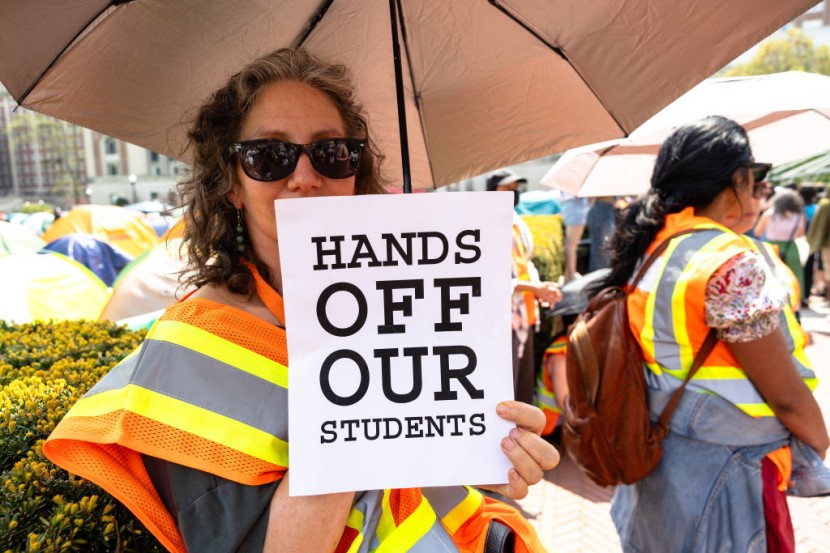
In the midst of pro-Palestinian protests sweeping college campuses nationwide, educators and staff throughout the country find themselves unexpectedly caught in the fray, facing potential arrest and suspension as they stand up for their students' rights
Annelise Orleck is just one of the many faculty members across the nation who feel a duty to support their students amid pro-Palestinian protests on college campuses, despite the possibility of arrest and suspension.
Orleck has been teaching U.S. and Jewish history for more than three decades at Dartmouth College, but during a protest on their campus last week, the 65-year-old began to fear the idea of becoming a key figure in future textbooks.
Officers exerted their force when they threw her to the lawn and knelt on her back as she yelled at police officers who were arresting students on the campus green.
Orleck said she couldn't breathe.
"It did occur to me that I could die," Orleck recalled.
After videos of the professor's arrest with local police went viral, it raised the question of outside intervention on campuses.
Orleck elaborated on her experience, revealing that her hands were zip-tied before officers escorted her to a van and then charged her with criminal trespass.
Subsequently, she was banned from parts of the campus as a condition of her bail, although the school claims the ban will be lifted.
Dartmouth President Sian Leah Beilock highlighted in a statement that the protesters' "actions have consequences."
The 65-year-old professor doesn't know what lies ahead in terms of repercussions from her job, but she says it would be worth standing with her students.
"We were just worried that they would be assaulted, and we were right to be worried," Orleck said.
"It never occurred to me that I, as an older woman Dartmouth professor, would be arrested."
She and other college faculty members across the country told The Washington Post that they've felt a responsibility to support their students and stand up for their own ideological convictions, especially against school officials who have called law enforcement on protesters.
Columbia University, the core of recent protests, showed school staff guarding the students' encampment. Hundreds of faculty at the University of North Carolina at Chapel Hill signed a petition in support of suspended student protesters, while at other colleges, some faculty members have even physically stood between police officers and students.
Arrests, suspensions, and injuries are several of the consequences professors are facing. Their divided support among pro-Palestinian and pro-Israel movements has served as a sign of solidarity with some students, while other students continue to receive harassment.
Senior program officer for the American Association of University Professors, Anita Levy, reported the faculty union has seen more universities taking action against professors in recent months for speaking against the Gaza war or advising student groups.
"Politicians are putting the pressure on administrations to crack down in ways that we haven't seen before," Levy continued.
"This is a significantly different moment" than other recent protest movements.
Washington University in St. Louis experienced one of the largest crackdowns, in which six faculty members were placed on leave due to their alleged involvement in an April 27 pro-Palestinian protest on campus.
"Universities are making up the rules as they go, trying to suppress free speech on campus," said Angela Miller, a professor of art history and archaeology and one of the faculty members facing discipline.
It's become so extreme that she said that if students need to meet her during office hours, an administrator must be present to monitor the interaction.
Emails she receives from students with questions regarding their final class projects are to be referred to the office manager for a response.
Megan Green, an adjunct professor in Washington University's School of Social Work, has also been placed on leave.
Michael Allen, a senior architecture lecturer, said he too has been banned from campus and is only permitted to complete grade work.
All three members confirmed they were only at the protest to observe and support their students.
"I thought the presence of faculty outside the encampment would help de-escalate the situation," Allen, 43, said.
"I had no idea within less than three minutes I would be in handcuffs."
Green told the Post that what started as a peaceful demonstration with students sitting and eating together turned violent as police arrested protesters on April 27.
Allen expressed that he would have backed student protesters regardless of what they were supporting.
Benjamin Robinson, an associate professor of Germanic studies at Indiana University, blocked a line of police officers dressed in riot gear on the Bloomington campus on April 25, as dozens of students stood behind him, arms linked together.
"These are kids," Robinson, who wore a shirt that said, "Jews Say Cease Fire Now," recalled telling officers.
"Are you going to use violence against them?"
Robinson and 33 other protesters were arrested, according to university officials.
He has since filed a lawsuit against Indiana University's trustees and president with two other plaintiffs, alleging the campus ban on faculty and student protesters violated their free-speech rights.
When asked how he would respond if police returned to the encampments on campus, he doubled down:
"I'd be back on the field with the students in a heartbeat."









